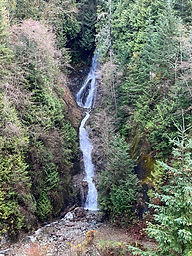How to Have a Nature-Friendly Halloween
- kc dyer

- Oct 25, 2023
- 2 min read
Updated: Aug 23, 2024
Fake Cobwebs Pose a Danger To Birds and Bats

Make a difference! Single-use plastics, dangerous decorations, palm oil in treats, microplastics… it’s time to take a fresh look at Halloween and get creative about how we celebrate this popular holiday.
Choose natural materials
Think earth-friendly materials like straw or hay bales, untreated wood and twine instead of harmful plastics… collect pinecones, twigs and leaves from the forest and make Halloween decorations with the kids.
Give fake cobwebs a miss
Fake spider webs are especially dangerous for birds and bats, trapping them with sometimes fatal consequences. In general, hang decorations at a safe height and avoid anything that could entangle birds, bats, bears, raccoons and other critters, including strings, nets and loose cords.
Avoid glitter, foil and balloons
Instead, go for earthy, non-reflective materials that blend in with nature. Small pieces of glitter, confetti and candy wrappers can be mistaken for food and will harm birds if swallowed.
Balloons bring joy while they last but can be a serious threat to birds – especially seabirds and marine mammals – if accidentally consumed. And they inevitably end up in the landfill where scavengers may ingest them. Consider alternatives such as paper lanterns and banners, or fabric bunting.
Minimize outdoor light
Artificial lights at night can throw migrating birds off-course, leading to exhaustion and disorientation. Limiting outdoor light after sunset is an easy way to be more bird friendly. Choose energy-efficient LED lights and avoid lasers completely (especially green): lasers scare birds, causing them to flee their nests and making them vulnerable to predators. Putting your Halloween lights on a timer so that they turn on and off at set times makes lights easy to manage. Or go super spooky with candles instead of lights!
Be eerie, not noisy
Loud noises can stress and harm birds, pets and wildlife. Eerie music and spooky sound effects can be so much scarier! Or maybe tell ghost stories around a campfire instead?
Pick your treats wisely
Palm oil is often an ingredient in treats, but the harvesting of this product has led to massive loss of habitat for many animals. Be a conscious shopper and read the label before buying trick or treat candies.
Learn about spooky birds, bats and spiders
Ravens, crows, owls, spiders and bats are an integral part of Halloween. Why not teach your kids some fun facts about these animals? Learning about birds and nature makes kids better stewards of the environment.
Keep our bears out of trouble
Hungry bears fattening up for hibernation may be enticed by your Halloween pumpkins. Keep your jack-o-lanterns indoors until 4 p.m. on Halloween and bring them in once the kids have headed off to fireworks on the beach, or no later than 10 p.m.
(Edited to add link to a BC event that happened the very day this article was posted: https://www.cbc.ca/news/canada/british-columbia/moose-rescue-fort-st-john-halloween-1.7008252 )
Have tips for a nature-friendly Hallowe'en to share? Leave your comments below, or email editor@lionsbaywatershed.ca








From reader Arlene Halstrom:
"When it comes to Palm oil in treats, check the cheaper chocolate bars as they are mostly the culprit. Often it is used to inhibit melting. Just read your labels. You will be surprised at the number of treats that have palm oil."